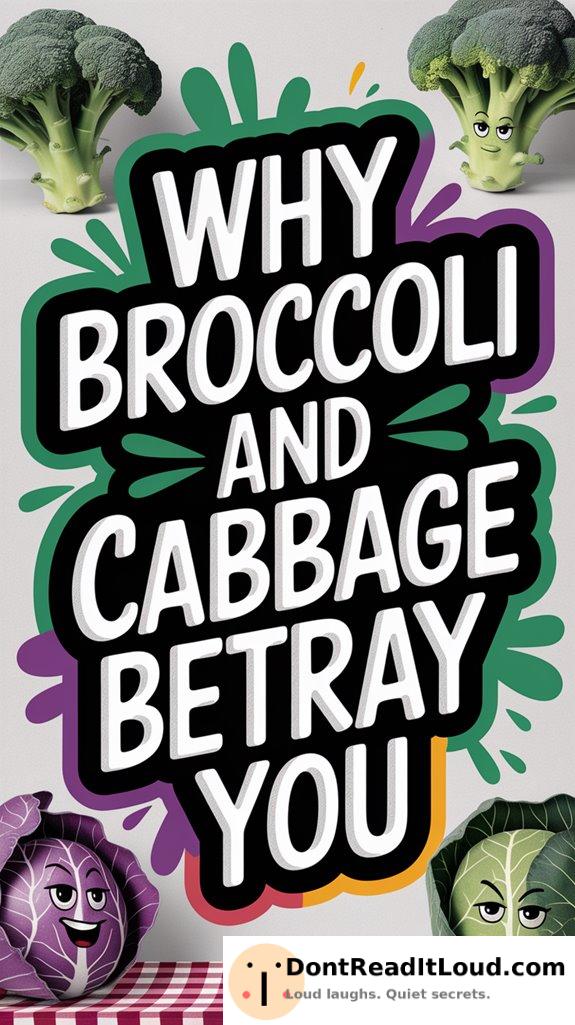
You eat broccoli and cabbage expecting a boost of vitamins, but these veggies can turn against you. Their tough fibers and sugars can cause bloating, cramps, and gas. They also contain compounds that interfere with your thyroid and prevent your body from absorbing minerals like calcium and zinc. This can leave you feeling tired or lacking nutrients. Eating them raw or overcooked may make these problems worse, so pay attention to how you prepare them. There’s even more you’ll want to know about their hidden effects.

Although you may think broccoli and cabbage are your kitchen allies, these vegetables can sometimes turn against you. It’s easy to assume every green vegetable is a nutritional hero, but the reality is more complicated. When you pile your plate high with broccoli and cabbage, you mightn’t realize you’re setting yourself up for unexpected digestive issues and even interfering with nutrient absorption.
Let’s start with your gut. Broccoli and cabbage both belong to the cruciferous family, and while they’re packed with vitamins, they also contain complex sugars and fibers that your body struggles to break down. Specifically, they’re loaded with raffinose and cellulose. You don’t have the enzymes to digest these compounds efficiently, so they make their way to your large intestine undigested. There, your gut bacteria get to work fermenting them, which produces gas. That’s why after eating a hearty serving of these veggies, you may experience bloating, cramps, or embarrassing flatulence. This discomfort can make you think twice about eating these foods, even if you know they’re healthy.
But digestive issues are only part of the betrayal. Broccoli and cabbage contain goitrogens, natural compounds that can interfere with how your body uses iodine. If you eat them in large amounts, especially raw, you risk disrupting your thyroid’s ability to produce essential hormones. This can slow your metabolism and leave you feeling tired. Even worse, it may prevent your body from absorbing important nutrients like iodine and certain minerals. You might think you’re fueling your body, but you could actually be missing out on nutrients you desperately need.
These vegetables can also mess with how your body absorbs minerals like calcium, magnesium, and zinc. The culprit? Phytates and oxalates, which are present in significant amounts in both broccoli and cabbage. These compounds bind to minerals in your digestive tract, preventing you from absorbing them properly. If you rely heavily on cruciferous vegetables for your daily greens, you might gradually develop deficiencies, even if you’re eating what seems like a balanced diet.
You might feel let down by this, but it doesn’t mean you have to banish broccoli and cabbage from your plate forever. Instead, it’s about moderation and preparation. Cooking these vegetables can reduce their goitrogenic potential and break down some of the fibers and sugars that cause digestive issues. Pairing them with other foods rich in vitamin C can help improve the absorption of certain minerals, offsetting some of their negative effects.
Conclusion
So, next time you pick up broccoli or cabbage, remember they aren’t as harmless as they seem. They’re full of nutrients, but eating too much can cause bloating, gas, or affect your thyroid. It’s tempting to trust their healthy image, but it’s important to notice your body’s response. Don’t let these veggies catch you off guard—enjoy them in moderation and pay attention to how you feel afterward.



